Dealing with Counterfeit Notes
Stop the transaction, request another note, and if possible, keep the suspected counterfeit.
Call the local police.
Record the details of how you received the note; time, number of notes, denomination, context, description of the individual(s) who gave you the note, etc.
Give the note only to the police, and always request a receipt (If the note is genuine, it will be returned to you).
REMEMBER
- Always check two or more security features.
- Compare a suspect note with one you know to be genuine.
- The authenticity of a bank note may be in question, not necessarily the integrity of the person passing it.
- Those who pass counterfeit notes may be innocent victims of crime.
- You can check bank notes without special instruments. The Bank of Canada cannot endorse any product or provide any warranty for devices used to validate security features on bank notes.
- It is a Criminal offence to knowingly use or possess a counterfeit bank note.
- The reproduction of bank notes is restricted under the Criminal Code and the Copyright Act.

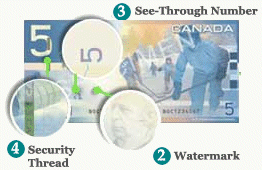
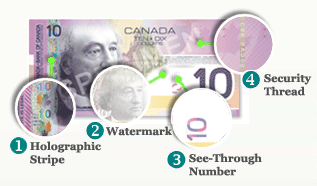
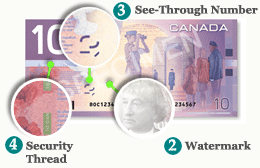
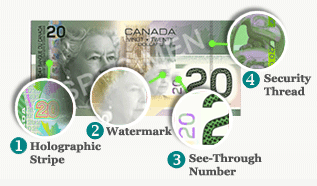
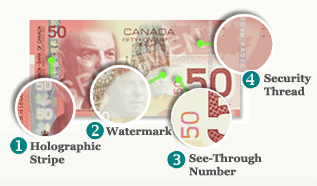
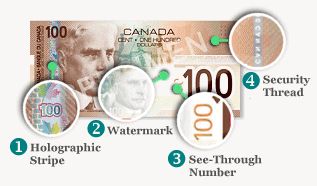
FOR ADDITIONAL INFORMATION
The Bank of Canada provides a variety of training tools and information to help you quickly, easily, and reliably identify genuine bank notes. Please contact:
Bank of Canada
Toll-free: 1-888-513-8212
Facsimile: (613) 782-7533
Email: education@bankofcanada.ca
Useful Links
Bank Notes – Bank of Canada
Bank notes: Training and education – Bank of Canada
Statistics on the counterfeiting of Canadian bank notes – Bank of Canada
Grandparents Scam
Beware of Grandparent Scams
Grandparent scams specifically target seniors by exploiting their love and concern for family. These scams often begin with a phone call from someone pretending to be your grandchild or another close relative, such as a son, daughter, niece, or nephew. The caller may already have personal details about you and your family, or they may use vague statements and rely on your responses to piece together a convincing story.
Posing as your grandchild, the scammer claims to be in urgent trouble and need of immediate financial help, often for bail, medical bills, or other emergencies. They may say they’ve been in a car accident, hospitalized, or even arrested. The sense of urgency is key: they want you to act quickly without verifying the story.
Scammers will typically ask for payment through methods that are difficult to trace or reverse, such as wire transfers, cryptocurrency, gift cards, or even by sending a courier to your home to collect cash.
Protect Yourself from Grandparent Scams
If you receive a suspicious call like this, follow these important steps:
- Do not send money. Take a moment to pause and verify the situation.
- Contact your grandchild or another trusted family member to confirm the story. Never rely solely on the caller’s word.
- Court-appointed couriers do not exist. If someone offers to come to your home to collect payment, it’s a scam.
- Be wary of high-pressure tactics. Scammers often create a sense of urgency to make you act quickly—this is a red flag.
- Always ask for identification and a call-back number. Legitimate callers will not hesitate to provide this information.
- Set a family “safe word” or phrase known only to close relatives. If you’re unsure about the caller’s identity, ask for this word to verify who they are.
If you believe you’ve been targeted or have already sent money, contact the Edmonton Police Service immediately at 780-423-4567 or #377 from your mobile phone.
You are not alone, and you are not to blame. Please don’t hesitate to come forward. We’re here to help.
If you send money or share financial information, report it to the financial institution used, e.g., your bank, Western Union, MoneyGram, Equifax, and TransUnion.
TransUnion – 1-800-663-9980 or https://www.transunion.ca
Equifax – 1-800-465-7166 or https://www.consumer.equifax.ca
Gather all information pertaining to the situation, including the scammer’s profile name, how you made contact, social media screenshots, emails, etc., and contact your local police.
File a report with the Canadian Anti-Fraud Centre – 1-888-495-8501.
For additional resources and tips on how to recognize and prevent senior scams, visit seniorfraudalert.ca.

